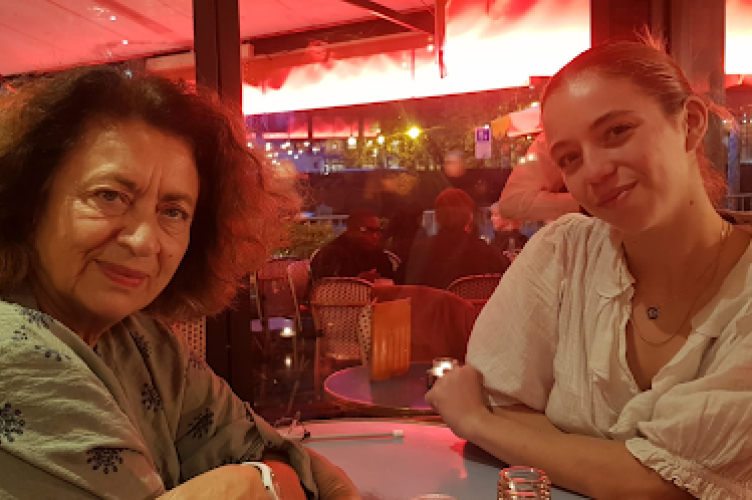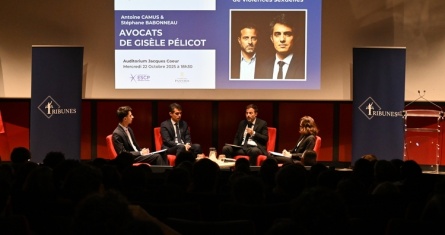Episode 1
From the series "Standing together: ESCP community united against gender-based and sexual violence"
A conversation between Ghada Hatem (ESCP 11), founder of La Maison des Femmes in Saint-Denis (2016), a holistic centre providing care and support to vulnerable women and survivors of violence, and Louise Blin (Bachelor 2025 alumna and MSc in International Business & Diplomacy student).
An unusual career path
Louise: Your career path is quite unusual: you studied medicine in Paris at the Necker-Enfants Malades hospital, specialising in obstetrics and gynaecology. After several years of practice, you completed a first master’s degree in medical management, then a second one at ESCP, before founding La Maison des Femmes in 2016. What led you to this evolution?
Ghada: My journey is often described as “unconventional,” and it’s true. I began in medicine, convinced that understanding the body meant understanding life. But very quickly, through my patients, I discovered that medicine isn’t just about treating organs: it’s also about listening, welcoming stories, silences, and wounds. Appointed quite young as head of maternity at Les Bluets, I felt it was essential to train in medical management to lead my team toward greater efficiency—hence my studies at EMAM, the public hospital management school.
Working with migrant and underprivileged populations strengthened my interest in “social medicine,” which considers context, life experiences, and invisible traumas. When I later took over the maternity ward at Saint-Denis Hospital, I again felt the need for management training—the challenges of transforming that ageing service were immense. That’s why I chose ESCP’s Specialised Master’s in Medical Management.
Finally, my patients’ stories helped me better understand how past experiences of violence impacted their health. That’s when I envisioned a care pathway dedicated to this issue. Addressing violence requires stepping outside traditional medical boundaries—organising multidisciplinary care involving professionals from healthcare, justice, and law enforcement. That’s how the Maison des Femmes model was conceived: with a holistic ambition to support and empower victims.
La Maison des femmes as a model
Louise: La Maison des Femmes has now become a model replicated even beyond France. Can you tell us more about its international development and what it represents to you?
Ghada: The Maison des Femmes in Brussels was our first “little sister.” That wasn’t initially planned—the model was designed only for Saint-Denis. But this adventure paved the way for others. It’s challenging, of course, since healthcare systems differ and public authorities aren’t always as involved as we’d hope.
Yet while health policies may vary, suffering looks the same everywhere. This international growth is close to our hearts, because women in many countries face compounded forms of violence, often tied to harmful traditions that must urgently be eradicated. And soon, Dakar will open its own Maison des Femmes, coinciding with the International Day of Zero Tolerance for Female Genital Mutilation in early February.
Education as a driver of change
Louise: In your view, what are the most effective levers to change behaviour—in education, law, media, or business?
Ghada: Prevention is the key. At our modest scale, our collective leads many initiatives. Raising awareness—at schools, universities, and workplaces—is crucial. It can sometimes change behaviours, but above all, it helps people understand victims’ experiences and aggressors’ logic. This makes it easier to detect early warning signs, support victims, and even identify perpetrators within organisations.
Education from an early age remains the most powerful—and longest-term—lever for deep transformation.
The media also play a vital role, both in spreading awareness and driving political advocacy.
Louise: People often reduce the fight against violence toward women to a feminist cause. Yet this struggle goes far beyond that. What place can—and should—men have in it?
Ghada: This fight does not belong only to women, nor should it be confined to feminism. It’s a matter of society, justice, public health, and human rights. Men have a crucial role to play. They must question their privileges, their inheritance, their silences, their relationship to power—and this patriarchal culture that has shaped behaviours for centuries. It’s not about accusation, but about raising awareness. Because living without men is neither desirable nor possible, we must build together. On this topic, I recommend two books: Do Men Really Want Equality? by Patric Jean, and How to Be Less Stupid in 10 Steps by Quentin Delval—humorous yet pragmatic.
The power of a committed young generation
Louise: ESCP trains the leaders of tomorrow. How can we instil in them a more inclusive, egalitarian vision of leadership? And what role can younger generations play in combating sexist and sexual violence?
Ghada: Training is good—but inspiring is better. Young generations crave meaning, fairness, and justice. They want to reinvent power structures. We must highlight diverse leadership figures and encourage more horizontal, human-centred management styles.
Laws such as the Copé-Zimmermann and Rixain Acts, promoting gender parity in leadership, also play a role. Yet there’s still much to do: 51% of young people believe a mother should stop working when she has a child, and 77% of girls say they feel uncomfortable in male-dominated spaces. These figures remind us that equality must be taught from the earliest age. Enhancing education on emotional and sexual life, tying public funding to gender equality criteria, and redesigning school curricula—these are concrete ways to move forward. The road will be long, but every step counts.
Louise: Looking back, what advice would you give ESCP students who want to balance their careers with social engagement?
Ghada: I would simply tell them: choose with love. Choose what moves you, what uplifts you, what gives meaning. Life will confront you with choices—between comfort and conviction, security and passion. But if you follow what truly resonates with you, you’ll always find your place. Choose a path aligned with who you are, not just what others expect. If your social commitment is sincere, you’ll always find a way to make it the heart of your professional life. Sometimes you must choose between comfort and conviction, career and cause—but following what deeply moves you means never betraying yourself. And I have faith: this next generation will follow that path with courage, creativity, and heart.
Ghada: Louise, I know you’re already aware of these issues, since your mother co-founded La Maison des Femmes Marseille Provence in 2020. First, I'd like to ask you, how do students in your generation react when faced with sexist behaviour in public?
Louise: In my generation, reactions to sexist behaviour depend greatly on its nature. Most often, we encounter what I’d call “everyday sexism”: normalised remarks, so-called “harmless jokes.” It’s precisely in those cases that reactions are the most muted. Many hesitate to intervene for fear of seeming “too much” or spoiling the mood.
The result, unfortunately, is a form of passive tolerance toward micro-violence—even though it’s the most common form. Conversely, when behaviour becomes more explicit or aggressive, responses are much firmer. Students are more willing to step in to remind others that it’s unacceptable. And when it comes to physical aggression or overtly violent behaviour, I believe there’s strong, almost unanimous mobilisation—among both women and men. That’s a hopeful sign: passivity is receding.
Ghada: What do you think could truly promote equality between women and men—freeing everyone from sexist stereotypes?
Louise: Like you, Ghada, I’m convinced that everything begins with education. For men, it means learning from childhood to recognise stereotypes, understand privilege, and adopt a more conscious, responsible stance—the only way to prevent patriarchal patterns from repeating indefinitely.
For women, the challenge is learning early that their voice has value, that they have both the right and legitimacy to speak out, and that raising awareness is not being “extreme.” Breaking stereotypes also means strengthening confidence and autonomy—exactly what La Maison des Femmes does with its patients. More broadly, better education on emotional and sexual health, more gender-equal educational content, and truly sensitised learning environments could change a great deal.
Campuses

